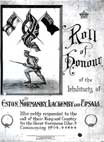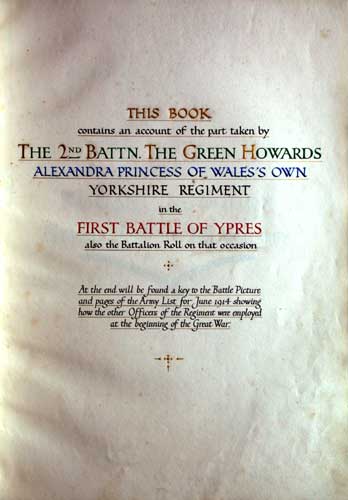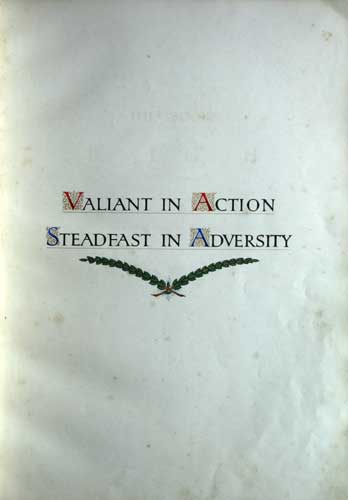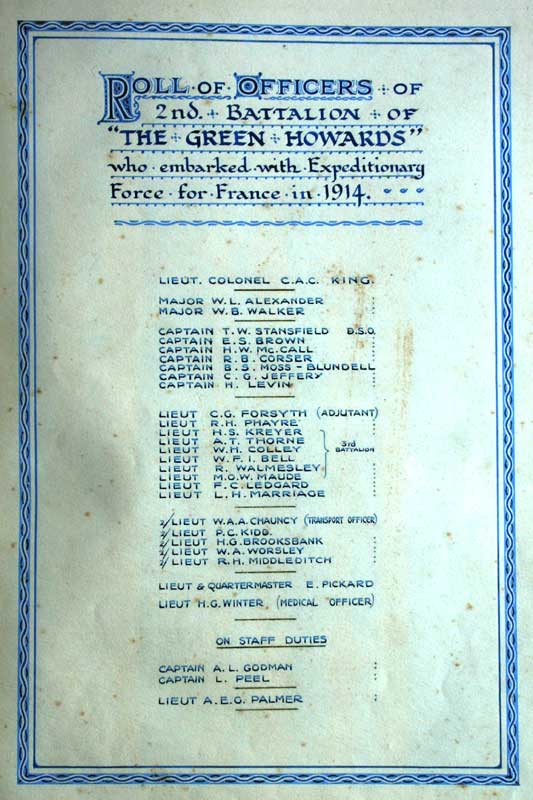 |
The
2nd Battalion Yorkshire Regiment, 1st Battle of Ypres - 1914. The Battalion Roll |
 |
The 2nd Battalion Yorkshire Regiment arrived in Ypres on 14 October 1914. Three weeks later, having taken part in the 1st Battle of Ypres, the remnants of the Battalion marched into Locre. Only a small number of the 1000-plus officers and men who took part in the Battle survived.
A book in the Green Howards Museum records some of the details of that Battle, and the Roll of all Officers and Men who took part in it. The fate of the individual Officers is given in the section on this website, - Photos of Groups.
Below, though, are;-
1 The Title Pages of the book recording the role of the 2nd Battalion in the 1st Battle of Ypres
2 An Account of the Battle, from this book.
3 The Roll of Officers who took part in the Battle, and
4 The Roll of all Warrant Officers, NCOs and Men who disembarked with the Battalion in Belgium in October 1914. 1064 names are listed, with regimental rank and number, and the date of death (and age at death) is shown.
 |
 |
"THE GREEN HOWARDS."
2nd Battalion.
ALEXANDRA PRINCESS OF WALES'S OWN YORKSHIRE REGIMENT.
On the 6th November, 1914, what was left of the 2nd Bn. THE GREEN HOWARDS marched into LOCRE, after holding for three weeks their bit of the living barrier that broke the onslaught of Germany on YPRES, and the Channel Ports. An Officer who served all through the War records that he never saw men in such a sorry plight.
They had three weeks' growth of beard and dirt on their faces. Their eyes were sunken far into their heads. They had not had their boots off for over three weeks; had been under hellish fire practically the whole of the time, subjected day and night to continual attacks which they had always repulsed.
They came to YPRES on the 14th October, and occupied the village of GHELUVELT without opposition the next day. They moved about for the next three days. Battalion H.Q. occupying a snail Estaminet, where they found a partly consumed meal on the table, which German Officers had not had time to finish before their arrival.
On the 16th - Sunday - they moved through BECELAERE, while the church bells were ringing for Service and the villagers "in their Sunday Best" were going into Church. This was the last time these bells rang, as the village was soon razed to the ground and the bells destroyed.
The Battalion then took up a very exposed position to the North of the cross-roads East of GHELUVELT, where they had dug their trenches two days previously, which they held until the 27th October. From this day on the enemy's shell fire was a crescendo of tremendous power; enormous numbers of troops were seen massing to the attack on the 21st, but were dispersed by the withering rifle fire of the Battalion.
The shell fire still increased; it seemed impossible anyone could live through it. Our Artillery replied splendidly but how we prayed for more and heavier guns. The climax oame on the 22nd; here is a record published at the tine of these supreme hours.
"The Germans had forced their way in between the SCOTS FUSILIERS and the YORKSHIRES, and the next few days were delirious with close and savage battling, as the Germans strove to enlarge the gap and get through. The YORKSHIRES strove just as vigorously to keep them out. For three days the YORKSHIRES held the safety of the Line and the Balance of the Battle in their hands. They were fighting on two fronts to head the Germans off. The fighting was bitter and ruthless. The Germans had a chance of victory. They gathered together all their energies to make that chance assured They strove to batter the Yorkshires out of existence. For three days the Battle rested over the disputed positions. It seemed impossible to hope that the Line would remain firm, but it remained firm. When the BEDFORDS restored the fracture in their line on Oct. 23rd what was left of the YORKSHIRES was still in the Trenches and was still fighting. The YORKSHIRES had not budged."
It was now imperative that the breach where the Bosch had broken through should be made good, and "A" Coy. and a Company of the GRENADIERS took over the trenches. The terrific enemy shell fire never ceased, but though our casualties were very heavy, his repeated attacks all along the line were driven back with tremendous loss.
It should be recorded that the Regimental Transport took six ammunition carts fully loaded up to the Battalion every night - 96,000 rounds. When, on one occasion, the supply fell short at midday, six carts came out in broad daylight. Caught by shell fire, they came through GHELUVELT at full gallop, losing all tools, etc., from the carts, but not a man or horse was wounded.
These enormous quantities of ammition were fired daily though the strength of the Battalion grew weaker. How men held on and kept up this unceasing rush of rifle fire is part of that mysterious power - born of training and discipline and the tradition of the Regiment - that make up the miracle of the First Ypres. The Armourer Sergeant, working day and night, carrying out small repairs to rifles in the Trenches, was utterly worn out. The Colonel ordered him back, when, standing up to salute, hie head was carried off by a shell. The enemy had the exact range of the trenches.
From the 24th to the 26th, "B" and "D" Companies suffered terribly. Officers and men showed a wonderful spirit, and as they were blown out of one trench those who were left moved right or left, but never retired. In vain the enemy pounded the trenches with his guns, sent forward his enormous reserves of infantry, only to recoil again from the whirlwind of fire. All night the men worked at rebuilding and digging new trenches.
It must be remembered that we had no wire in those days and, when a limited amount was forthcoming, General Capper (Div. Commander) assured the Chief Engineer that the 2nd YORKSHIRES could hold on without.
On the 26th a concentration for an attack was carried out in daylight at H.Q. at the cross-roads, costing many lives, but the Battalion was by this time reduced to half its strength through nine days' continuous fighting, and fortunately an attack on the German masses was abandoned.
At last on the 27th, we were moved back to SANCTUARY WOOD for a rest, but no sooner had we bivouacked, than the order came to move up into the advanced fire trenches immediately. The exhausted men, comfortably fixed up for the night, kits, blankets, camp kettles, etc. brought up from YPRES, fell in at once and no one grumbled. The Colonel was"very ill and worn out, but nothing would keep him from his men.
On the morning of the 29th, the enemy succeeded in breaking through a Regiment on our left, and threatened our left rear. The Line was forced to fall back under devastating fire for about half a mile - two platoons of "A" Company being the last to retire. Colonel King then reorganized the Battalion, collected anyone he could lay hands on from other Units, formed them up in the road, and led an attack with this scratch force, which not only recaptured the former positions but later in the day swept forward and occupied some trenches two hundred yards in front. This attack was carried out in four lines, and the enemy picked up the range directly the first line advanced; there were many casualties, but the lines went on as if on parade. Colonel King's prompt and gallant action and the magnificent way it was carried out once again "saved the Line."
Next day in an attack of overwhelming numbers of infantry and appalling bombardment, Colonel King was killed among very heavy losses of Officers and men. Still the men held on, and no enemy passed the GREEN HOWARDS, nor did the Battalion give a yard. Their strength was now three hundred, a Captain in command.
In the afternoon of that day, the 30th, the order to retire was received about 3.30, the messenger having been delayed three hours working his way through a wood occupied by the enemy. Captain Moss-Blundell, however, decided not to wait until dark, heavy firing having commenced in our rear.
Fortunately heavy casualties were avoided owing to the poor shooting of the enemy and the coolness of the men. The new position was occupied with a loss of only 11 men, and the night was spent in digging fresh trenches. Early next morning the remnant of "A" Coy. was sent forward again to fill a gap between two regiments for several hours.
On Nov 4th, the Battalion was moved into Brigade Reserve. Relief came next day and after three weeks of almost intolerable strain, what was left of the Battalion that had borne its splendid part in one of the greatest ordeals of History was withdrawn at last. What Major-General Capper, C.B., D.S.O., Commdg. 7th Div. thought of our 2nd Battalion may be gathered from the following extracts taken from his speech which he made to the Battalion after we had noved to SAILLY:-
Officers, N.C.0.s and Men of the 2nd Battalion YORKSHIRE REGIMENT, I have tried many times to catch you and speak to you. Now I have got you, I am going to tell you what I think of you. I think you have done splendidly. In the fierce and heavy fighting we have undergone together you have done magnificently. You have taken part in probably the fiercest fighting the world has ever seen.
I have often watched you in the Trenches with especial interest, and on one occasion at the cross-roads at GHELUVELT (a very precarious position), I asked who was holding that particular line of Trenches, which seemed a weak spot. When I was told the 2nd YORKSHIRES I knew it would be all right. I knew that, though the line was weak, I was not afraid. I KNEW IT WAS A REGIMENT I COULD HANG MY HAT ON AT ANY TIME OF THE DAY OR NIGHT. There is not a single Regiment in the Division for which I have more respect. I do not say it to butter you up. I say it because I mean it.
In the time to come, your Officers will be brave and will lead you on. I an not going to thank you for what you have done - that is for someone else to do. Your Country and your County - YORKSHIRE - will give you your reward.
The following telegram was received on the 31st October by the
Commanding Officer (Major Alexander).
From 1st Army Corps.
To 7th Division.
Please congratulate the YORKSHIRES on their stout performance.
O.C. 2nd YORKSHIRE REGIMENT.
The G.O.C. wishes me to forward this on to you and to say that he entirely concurs.
W. DRYSDALE, Capt.
Bde. Major, 21st Infantry Brigade.
-----------------> Return to top of the page

-----------------> Return to top of the page
The above Roll has been transcribed, and the Roll has then
been compared with the names of the men who died and are buried in a Commonwealth
War Grave or commemorated on a Commonwealth War Memorial.
Of the 1064 names on the original Roll, 366 are recorded as having died
by the Commonwealth War Graves Commission.
The complete Roll can be viewed as a PDF file by selecting the link, below;-
When viewing this Roll, there are a few points to bear in mind;-
1 Some of the men listed transferred
to other Battalions or regiments.
Thus, not all will have been in the 2nd Battalion
at the time of death.
2 One man, Captain Marmaduke Thwaites, had been promoted from WO to Officer by he time he was killed.
3 Three of the soldiers were under-age
at the time of death, and one (Drummer Hammond) although he died aged 19
would only have been aged 16 in October 1914.
-----------------> Return to top of the page
